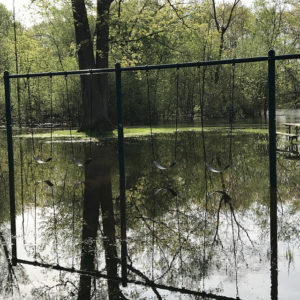
A Huron River Perspective
by Rebecca Esselman and Dan Brown
The Fourth National Climate Assessment was released on Black Friday. This congressionally mandated evaluation includes dire warnings about the effects of climate change on the United States. If we fail to act quickly to curb carbon emissions and adapt to the inevitable changes already locked in, we will face potentially deadly conditions and place enormous costs on our kids and grandkids.
The report is the gold standard for climate change studies in the United States. It is comprehensive, is based on the best science available and it draws on the expansive knowledge of 13 federal agencies and thousands of world-class scientists from around the globe. With each iteration of the National Climate Assessment, the certainty and urgency associated with the effects of climate change, present and future, have increased dramatically.
For Michigan and the Midwest, climate change is a story of water and our relationship to it. We pride ourselves on our freshwater resources, the vastness of the Great Lakes, and pristine rivers. Water is what puts the “pure” in Pure Michigan.
But climate change threatens to upend our connection to water. The Great Lakes themselves are changing rapidly in ways we don’t fully understand, putting the world’s largest freshwater ecosystem in jeopardy. Our strongest storms are growing more severe and more frequent. That leads to abrupt, damaging flows across the landscape that flush more pollutants to our waterways, providing a key ingredient for algal blooms and putting us at greater flood risk
“Climate change will only further exacerbate the vulnerability of populations under stress in the Midwest,” according to Maria Carmen Lemos, an author on the report’s Midwest Chapter. “However, the chapter also finds that the Midwest may actually experience migration into the region because of climate change. Because this is a long-term prospect, the report may give cities the impetus to understand climate impacts and adapt to them to better prepare for this possibility.”
HRWC works at the intersection of water, climate change and communities, both in our watershed and regionally. River restoration, riparian protection and environmental flow management are strategies we employ to prepare the river for more extreme rainfall and higher heat. With partners throughout the watershed, HRWC promotes stormwater management that anticipates increasing rainfall. And HRWC works with other Great Lakes cities to assess vulnerabilities to climate change so that future risks can be reduced by actions taken now.
Limiting the negative impacts of climate change on Michigan’s waters will require support from environmental groups, universities, governments, private businesses, and individuals. We need groups to acknowledge the problem and work collaboratively, and we need guidance from state and federal agencies.
According to Jenna Jorns, another author of the report’s Midwest Chapter, “Continuing support for these types of collaborations and scaling up successful tools and processes will be critical to help communities better prepare for the future.”
There is much we can do to fight climate change and there is much we must do quickly to avoid the worst effects. HRWC will continue to work with communities to prepare for a changing climate, promote actions that reduce greenhouse gas emissions, and network with other groups essential to ensuring we achieve progress at the scale necessary to avoid the worst outcomes laid out in the National Climate Assessment.
For more information read the Midwest Chapter of the National Climate Assessment. And learn more about what HRWC is doing to address climate change.



